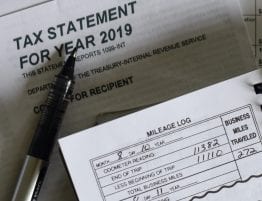Getting a notice for an audit from the IRS can be scarier than the best of horror movies. But an audit doesn’t mean you have done anything wrong. It only means the IRS wants to check if you’ve been doing things correctly.
The IRS routinely conducts audits. Sometimes audits are conducted randomly and sometimes the IRS has noticed some unusual activity in your tax records about which they need information. Many times, after an audit, it is found that the IRS owes the taxpayer, and not the other way around.
An audit doesn’t mean you have to face a stern-looking IRS agent demanding answers from you. Largely, IRS conducts audits via correspondence so that you communicate with the IRS through the mail. If the IRS contacts you for information, it is mandatory to respond to it on time. Money Rates lists what you need to do when contacted by the IRS.
- “Consider the source – it may be a tax scam
IRS scams, in which thieves pose as IRS agents and contact taxpayers, are a persistent problem. In some cases, getting victims to make bogus tax payments or pay fictitious fines can mean instant dollars for a scammer. Identity thieves may play a longer game, using the contact to get sensitive personal and financial information from you that they can use to drain your accounts and abuse your credit in the future. The people behind these tax scams count on the fact that being contacted by the IRS can throw even the most honest taxpayer into a state of panic. Naturally, people feel a certain pressure to comply and often don’t think clearly in the moment — which makes them easy prey for someone with dishonest intent. However, the IRS advises you that they never contact people by phone, e-mail, or in person without first sending a written notification by U.S. mail. So if someone contacts you from out of the blue claiming to be from the IRS, don’t believe them if they haven’t first mailed you a notification.Further, the IRS says they do not ask people to make immediate payments without an opportunity to appeal. And remember that the IRS will send you a written bill before demanding payment. So, if someone calls demanding credit card information or something similar so you can make immediate payment, it is probably a scam. - Get your paperwork together for an IRS audit
Assuming you verify that contact comes from a legitimate IRS representative, what should you do next? Chiefly, don’t panic. While people tend to associate IRS audits with an investigation of wrongdoing, most are fairly routine. Calmly find out what information the IRS wants and then get your paperwork together. Determine which years the IRS is interested in and gather your returns and records for those years. You’ll need to be able to verify your income and document any deductions and credits you took during the years in question. Review the information to make sure there aren’t any mistakes or other issues you need to address. - Notify your tax preparer
If you have a paid tax preparer, notify them about the IRS inquiry immediately and find out what support they can give you through the process. A tax preparer who signed off on your return should be willing to assist you in the audit process, though they may charge extra for certain services. This help can be valuable because they are familiar with audits, relevant tax law, and the methodology used in preparing your return. - Build a savings account for tax payments
If there is a possibility you might end up owing the IRS, start setting aside some money even if you are still in the process of discussing the case. The reason is that, if the decision goes against you, the sooner you can pay any money owed, the more likely you’ll be able to avoid additional fines and interest payments. Having money accessible in a savings account for tax payments will allow you to close the matter as quickly as possible. - You can appeal the outcome of an IRS audit
If you disagree with the conclusions the IRS comes to, you can appeal the outcome. The IRS has an Office of Appeals designed to provide an impartial review of IRS actions. According to the IRS, this Office of Appeals is able to settle most issues that come before it. However, if you are not satisfied with the outcome after you go before the Office of Appeals, you still have the option of going to court. - Negotiate payment terms
If things go against you and you owe the IRS an amount you can’t readily pay, work with the IRS to negotiate payment terms. Don’t expect the IRS to do you any favors in that situation, but they do have an interest in finding the best way they can ultimately get the money they’re owed. Try to work out payment terms that are reasonable to your situation; but keep in mind that the longer you stretch out the payments, the more it is likely to cost you.”
Fill out the form for a free and confidential consultation.








